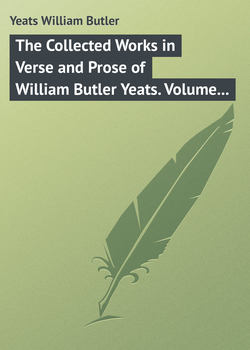Читать книгу The Collected Works in Verse and Prose of William Butler Yeats. Volume 8 of 8. Discoveries. Edmund Spenser. Poetry and Tradition; and Other Essays. Bibliography - Yeats William Butler, William Butler Yeats - Страница 23
EDMUND SPENSER
I
ОглавлениеWe know little of Spenser’s childhood and nothing of his parents, except that his father was probably an Edmund Spenser of north-east Lancashire, a man of good blood and ‘belonging to a house of ancient fame.’ He was born in London in 1552, nineteen years after the death of Ariosto, and when Tasso was about eight years old. Full of the spirit of the Renaissance, at once passionate and artificial, looking out upon the world now as craftsman, now as connoisseur, he was to found his art upon theirs rather than upon the more humane, the more noble, the less intellectual art of Malory and the Minstrels. Deafened and blinded by their influence, as so many of us were in boyhood by that art of Hugo, that made the old simple writers seem but as brown bread and water, he was always to love the journey more than its end, the landscape more than the man, and reason more than life, and the tale less than its telling. He entered Pembroke College, Cambridge, in 1569, and translated allegorical poems out of Petrarch and Du Bellay. To-day a young man translates out of Verlaine and Verhaeren; but at that day Ronsard and Du Bellay were the living poets, who promised revolutionary and unheard-of things to a poetry moving towards elaboration and intellect, as ours – the serpent’s tooth in his own tail again – moves towards simplicity and instinct. At Cambridge he met with Hobbinol of The Shepheards Calender, a certain Gabriel Harvey, son of a rope-maker at Saffron Walden, but now a Fellow of Pembroke College, a notable man, some five or six years his elder. It is usual to think ill of Harvey, because of his dislike of rhyme and his advocacy of classical metres, and because he complained that Spenser preferred his Faerie Queene to the Nine Muses, and encouraged Hobgoblin ‘to run off with the Garland of Apollo.’ But at that crossroad, where so many crowds mingled talking of so many lands, no one could foretell in what bed he would sleep after nightfall. Milton was in the end to dislike rhyme as much, and it is certain that rhyme is one of the secondary causes of that disintegration of the personal instincts which has given to modern poetry its deep colour for colour’s sake, its overflowing pattern, its background of decorative landscape, and its insubordination of detail. At the opening of a movement we are busy with first principles, and can find out everything but the road we are to go, everything but the weight and measure of the impulse, that has come to us out of life itself, for that is always in defiance of reason, always without a justification but by faith and works. Harvey set Spenser to the making of verses in classical metre, and certain lines have come down to us written in what Spenser called ‘Iambicum trimetrum.’ His biographers agree that they are very bad, but, though I cannot scan them, I find in them the charm of what seems a sincere personal emotion. The man himself, liberated from the minute felicities of phrase and sound, that are the temptation and the delight of rhyme, speaks of his Mistress some thought that came to him not for the sake of poetry, but for love’s sake, and the emotion instead of dissolving into detached colours, into ‘the spangly gloom’ that Keats saw ‘froth and boil’ when he put his eyes into ‘the pillowy cleft,’ speaks to her in poignant words as if out of a tear-stained love-letter:
‘Unhappie verse, the witnesse of my unhappie state,
Make thy selfe fluttring winge for thy fast flying
Thought, and fly forth to my love wheresoever she be.
Whether lying restlesse in heavy bedde, or else
Sitting so cheerlesse at the cheerful boorde, or else
Playing alone carelesse on her heavenlie virginals.
If in bed, tell hir that my eyes can take no rest;
If at boorde tell her that my mouth can eat no meate;
If at her virginals, tell her that I can heare no mirth.’
